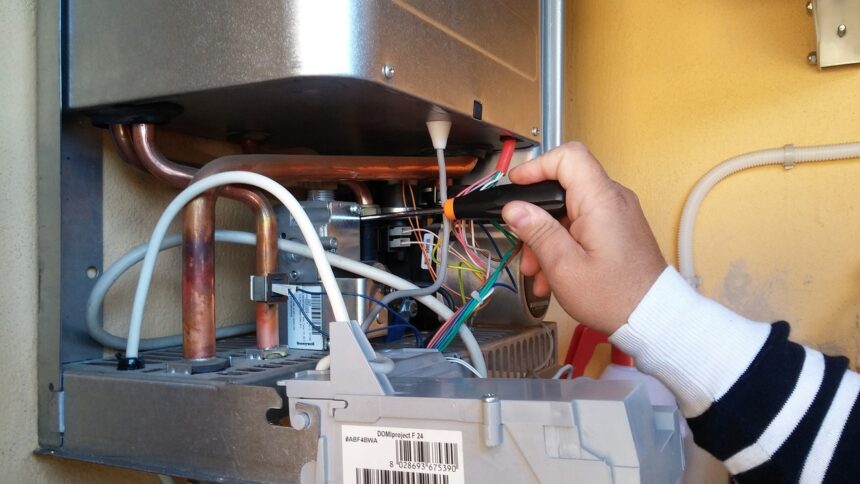When selecting the ideal water heater for your home in Orange County, it’s essential to delve into the two primary options available: Tank and tankless water heaters. These systems operate differently, each presenting unique advantages and drawbacks. In this comprehensive guide, we examine the pros and cons of both tank and tankless water heaters, and when to get Orange County water heater repair.
As a resident of Orange County, factors such as climate, water quality, and household size can influence your decision-making process. By carefully evaluating the pros and cons of both tank and tankless water heaters against your specific requirements, you can make an informed choice that aligns with your priorities. Whether prioritizing affordability, energy efficiency, or long-term reliability, selecting the right water heater will ensure your home remains comfortably supplied with hot water while optimizing cost-effectiveness and sustainability.
Tank Water Heaters
Tank water heaters are the traditional option that most people are familiar with. As the name suggests, these water heaters consist of a large tank that stores and heats a specific amount of water. When you turn on the hot water tap, the heated water from the tank is delivered to your faucet or shower.
One of the main advantages of tank water heaters is their affordability. They are generally less expensive to purchase and install compared to tankless water heaters. Additionally, tank water heaters are capable of providing a large volume of hot water, making them suitable for households with high hot water demands.
However, there are some downsides to consider. Tank water heaters consume more energy because they constantly heat and store water, even when it’s not being used. This can result in higher energy bills over time. Additionally, tanks have a limited capacity, so if you exceed the amount of hot water stored in the tank, you may have to wait for it to fill up again.
Tankless Water Heaters
Tankless water heaters, also known as on-demand water heaters, have gained popularity in recent years. Unlike tank water heaters, tankless models do not store hot water. Instead, they heat the water as it passes through the unit, providing hot water on demand.
In addition to their energy efficiency and longer lifespan, tankless water heaters offer several other benefits that make them an attractive option for many homeowners.
Firstly, their compact size is a significant advantage, particularly for those with limited space. Traditional tank water heaters can take up a considerable amount of room, often requiring a dedicated utility closet or basement space. In contrast, tankless units are much smaller and can be installed on walls, inside cabinets, or even outdoors, freeing up valuable floor space for other uses.
Another advantage of tankless water heaters is their continuous hot water supply. Because they heat water on demand, there’s no risk of running out of hot water during long showers or when running multiple appliances simultaneously. This can be especially beneficial for larger households or families with high hot water demands.
Furthermore, tankless water heaters are generally more environmentally friendly than their tank counterparts. Since they only heat water as needed, there’s less energy wasted on standby heat loss, which occurs when hot water sits in a tank waiting to be used. This reduced energy consumption translates to lower greenhouse gas emissions and a smaller carbon footprint.
Additionally, tankless water heaters typically require less maintenance compared to tank models. Without a tank to store water and accumulate sediment, there’s less risk of corrosion or mineral buildup, which can affect the performance and longevity of traditional water heaters. This can save homeowners both time and money on maintenance and repairs over the lifespan of the unit.
Despite these advantages, it’s essential to consider the specific needs and circumstances of your household before deciding whether a tankless water heater is the right choice for you. Factors such as your hot water usage patterns, the size of your home, and your budget will all play a role in determining which type of water heater is the best fit for you. Consulting a qualified plumber or HVAC technician can help you weigh the pros and cons and make an informed decision about whether to invest in a tankless water heater for your home.
So, which option is best for Orange County residents? The answer depends on your needs and preferences. If you have a small household with low hot water demands and you’re looking for an affordable option, a tank water heater may be suitable for you. On the other hand, if you value energy efficiency and long-term cost savings, a tankless water heater may be the better choice.
Conclusion
In conclusion, the decision between a tank and tankless water heater hinges on a variety of factors, each with its own set of advantages and disadvantages. For instance, traditional tank water heaters offer the benefit of lower upfront costs and simplicity of installation. However, they tend to be less energy-efficient, leading to potentially higher long-term utility bills. On the other hand, tankless water heaters boast superior energy efficiency, as they only heat water on demand, resulting in potential savings over time. Yet, they typically come with a higher initial investment and may struggle to meet high hot water demands simultaneously in larger households.
As an Orange County resident, your decision should consider not only the upfront cost and energy efficiency but also your specific hot water needs. If you have a smaller household with modest hot water demands and prioritize affordability, a traditional tank heater may be the sensible choice. Conversely, if you value energy savings and have a larger household with fluctuating hot water needs, a tankless water heater could offer greater long-term benefits despite the higher initial cost.
Ultimately, by carefully weighing the pros and cons of each option against your individual requirements, you can make an informed decision that aligns with your priorities as an Orange County resident. Whether it’s reliability, cost-effectiveness, or environmental sustainability, selecting the right water heater will ensure your home stays comfortably supplied with hot water while minimizing unnecessary expenses.












